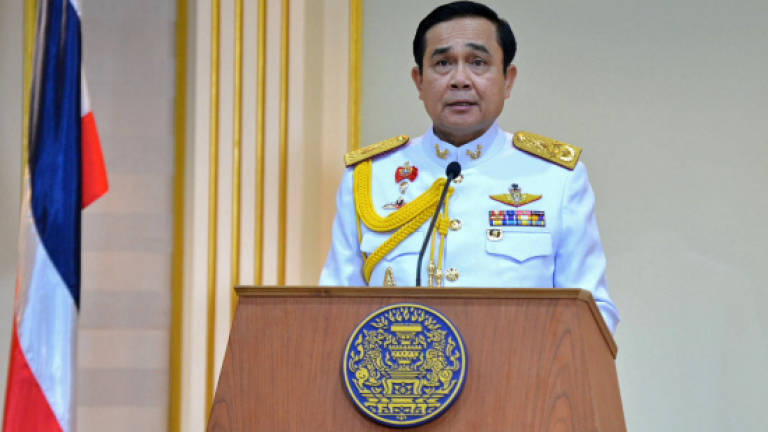Thai king endorses coup leader as prime minister

BANGKOK: Thailand's coup leader was formally endorsed as prime minister by the nation's revered king on Monday, in a step towards forming a government to oversee sweeping reforms in the politically turbulent kingdom.
Army chief General Prayut Chan-O-Cha, 60, who ousted an elected government in a bloodless power grab on May 22, was chosen uncontested as premier last week by a national assembly made up mainly of military figures.
In a brief but elaborate ceremony to receive the royal command, Prayut -- wearing a white official uniform -- knelt and bowed in front of a large portrait of King Bhumibol Adulyadej.
"His majesty the king has appointed me prime minister. I am extremely grateful... this is a great honour for me and my family," Prayut said after the ceremony.
"I will work with honesty and for the benefit of people and the nation," he added.
The top general, who was endorsed as premier on Sunday but was officially given the royal command a day later, will also remain head of the junta as the military appears to tighten its grip on power.
A junta spokesman said Prayut would pick a cabinet and propose ministers for the king's approval in September.
The junta, formally known as the National Council for Peace and Order (NCPO), says it was forced to take power after months of protests left nearly 30 people dead and hundreds more wounded, paralysing the government, cramping the economy and frightening off tourists.
It has ruled out holding new elections before October 2015, despite international appeals for a return to democracy, vowing first to oversee reforms aimed at cleaning up politics and society.
Call to protect rights
Japan, Thailand's single biggest foreign investor, on Monday urged a "smooth and early transition" to an elected democracy.
The statement, by the Ministry of Foreign Affairs in Tokyo, also said Japan was "particularly attentive" to the protection of "basic rights and freedoms" in the kingdom.
Rights groups have condemned the junta for smothering dissent since seizing power.
Protests are banned under martial law while hundreds of activists and political opponents were summoned by the military after the coup -- although most were released within days.
The United Nations last week also expressed alarm at a number of arrests and stiff jail sentences meted out since the coup for defaming Thailand's monarchy.
King Bhumibol Adulyadej, 86, is revered by many Thais and protected by tough defamation laws that carry a maximum jail sentence of 15 years for each conviction.
At least 13 new royal defamation cases have been opened while other allegations have been revived, the UN said, warning of the "chilling effects" of such cases on freedom of expression.
Critics say months-long protests that proceeded the coup provided a pretext for the power grab against the former government led by the powerful Shinawatra clan.
Yingluck Shinawatra, sister of the billionaire former premier Thaksin, was prime minister until she was thrown out of office by a controversial court decision weeks before the May 22 coup.
Prayut, whose term as army chief finishes at the end of September, is seen as a staunch opponent of the fugitive Thaksin, whose overthrow in an earlier coup in 2006 triggered Thailand's long-running political crisis.
The junta has purged many of Thaksin's point men in government ministries and the police, saying its mission is to bring the nation together and fight corruption.
Thaksin is reviled by much of Thailand's Bangkok-based royalist elite, but draws deep loyalty from the poor but populous northern portion of the country.
His parties have won every election since 2001 -- even though the billionaire policeman-turned-businessman fled Thailand in 2008 to avoid jail for a corruption conviction. – AFP